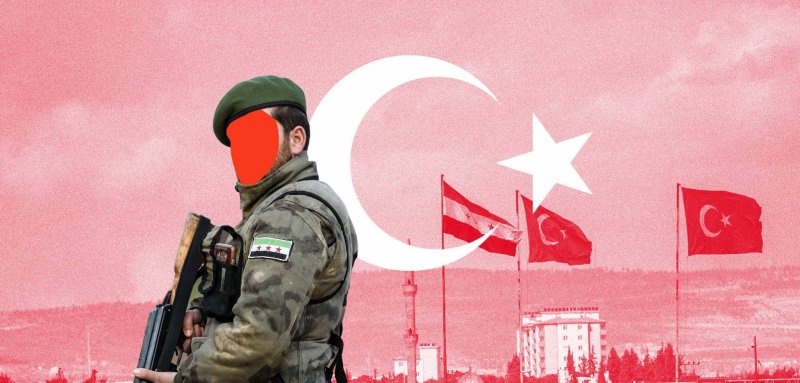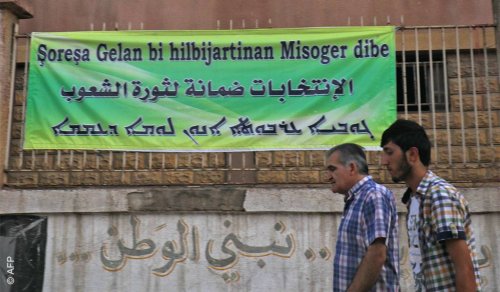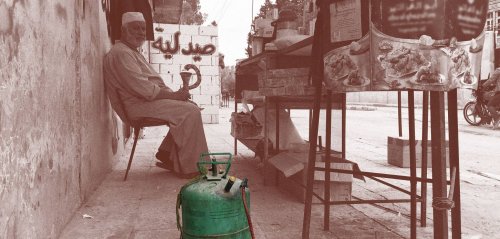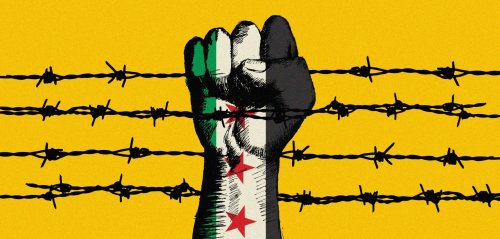More than 900 kilometres of border separate Syria from Turkey, a border strip that Ankara insists must be policed. Deeming events in this stretch of territory as inextricably tied to its own national security, Turkey has proceeded to operate deep inside the Syrian border, launching two major military operations alongside allied Syrian opposition forces. The first of these took place in 2016, codenamed Operation “Euphrates Shield”, and along with the second, launched two years later – Operation “Olive Branch” – placed an area of 4,000 square kilometres under Turkish influence, in partnership with Syrian opposition forces.
Afrin: a city with new landmarks and residents
With the end of the battle in March 2018 between the Kurdish forces previously in control of Afrin on one hand, and the Turkish military and allied opposition factions on the other, the number of residents displaced from Afrin reached 170,000 – a majority of the original inhabitants of the region according to the United Nations Office for the Coordination of Humanitarian Affairs (OCHA).
Among those who remained were residents subjected to violations by certain opposition factions that would come to control the area, before a period of relative stability paved the way for the return of more refugees to the region.
The offensive saw only few Kurds remain in Afrin – though more have since returned with the stabilisation of the region. Many however have been met by the iron fist of some opposition factions operating in the area, who have notably sought to exploit the agricultural harvests of the farming inhabitants.
To give a brief background, the Turkish military operation was launched in cooperation with a collection of Syrian opposition factions on January 20, 2018 – targeting the Kurdish People’s Protection Units (YPG), the military wing of the Democratic Union Party (PYD). Ankara accuses the PYD/YPG of being an affiliate of the Turkey-based Kurdistan Workers’ Party (PKK), which is designated as a terrorist organisation by Turkey as well as a number of other countries around the world. The operation would conclude with the successful occupation of the city of Afrin and its countryside by Turkey and the opposition forces.
There are few accurate numbers on the original population of the Afrin region, which comprised a mix of Kurds and Arabs, with the former constituting the majority. Estimates by Turkish sources put the number at 350,000 residents, whereas sources from Afrin claim that a further half a million Syrians displaced from other regions also resided there.
Ahmed Ibrahim, 20, a university student living in Afrin, told Raseef22: “Right now the remaining peasants are being forced to sell their agricultural yields of wheat and barley at half its value. As for the harvests that were left by the peasants who fled, they were stolen by the [opposition] factions, while Turkish merchants have monopolised the purchase of olives.”
Basma Saqbani, a 27-year-old journalist who was displaced from Eastern Ghouta by the Assad regime to the countryside of Aleppo, said that she was offered a house in Afrin but refused to accept it.
“I could not accept the idea of living in a house of those who were displaced in a similar way to what happened to us in Ghouta, and secondly, the Kurdish [YPG] units planted mines in many houses in Afrin,” she said.
Afrin had become a sanctuary for tens of thousands of internally-displaced Syrians (IDPs), who believed that the absence of military hostilities in the region prior to January 2018 made it a suitable area for relocation – after their own cities and original villages had been destroyed.
Abu Karim al-Asmar, 32, an administrative employee in an Afrin hospital who had fled to the city from Eastern Ghouta, said: “Security is available in the region of Afrin where bombardment and warplanes are absent, but the area is not always free of concealed explosives and IEDs [Improvised Explosive Devices], as well as the violations by the [opposition] factions against civilians. I am content with my life here compared to the people who live in camps and unsafe areas under bombardment by warplanes.”
A local council in Afrin was established in April 2018, constituting 20 seats distributed according to the city’s demographic components, with Kurds receiving 11 seats, Arabs eight and Turkmen one. The local council was linked to the province of Aleppo, and by extension, the Syrian National Coalition for Revolutionary and Opposition Forces (SNC) – the nominal political representative of the Syrian opposition.
Jwan Abdul Karim is a 35-year old journalist living in Afrin, and has continuously resided in the area since before the ‘Olive Branch’ operation. He has therefore kept a close eye on the developments in the region, and is in daily contact with Afrin’s activists. Abdul Karim is sceptical of the ability of Afrin’s local council to manage the affairs of the city, saying: “The council is unable to protect its members from the factions’ violations.”
Since its formation the council has been headed by an engineer, Zuhair Haidar, who on assuming the post declared: “The people of Afrin will administer themselves.” In Abdul Karim’s opinion however, “the council did not have authority over the Olive Branch factions; rather, its decision[-making] was subsidiary to the Turkish province of Hatay.”
He added: “Haidar isolated himself after approximately six months after the council’s establishment, and after that was arrested by the Turkish Army on suspicion of corruption, according to what was rumoured then, a few days before his brother was also arrested.”
The head of the legal committee in the council, lawyer Sadiq al-Najjar, was also arrested on November 12, 2018 and charged with being a member of the Kurdish YPG – despite having been previously known for his opposition to the group, leaving the council with little legal authority.
Since the operation, international organisations have monitored violations in Afrin – especially those targeting Kurds who did not leave the city. According to the Syrian Observatory for Human Rights, violations in the area have included killing, kidnapping, arrest, looting, robbery, financial extortion, and finally the seizure of Kurdish property with the aim of producing a demographic change in the area.
‘Euphrates Shield’: development without a return of refugees
In recent times, Turkish authorities have continuously reported the return of Syrian refugees from Turkish cities to territories under its influence in northern Syria. Claims of widescale refugee returns are, however, denied by civil bodies in the ‘Euphrates Shield’ area (under joint Turkish-opposition control in the province of Aleppo), who claim that the number of returnees may not even match the numbers of those continuing to seek refuge in Turkey.
Living conditions in the main cities of the Euphrates Shield area – namely Al-Bab, Jarablus and Azaz – are largely similar, with differences lying in the details which seem important to the local population, such as the affiliations of an armed faction in a specific area.
Operation ‘Euphrates Shield’ was a military operation launched by Turkey in collaboration with a group of Syrian opposition factions on August 24, 2016, with the aim of fighting ISIS (Islamic State in Iraq and Syria) in the regions near the Turkish border as well as the Kurdish YPG. The operation was Turkey’s first direct military intervention in Syria, and was declared completed on May 29, 2017. In the aftermath of the operation, Turkey would impose its influence on dozens of Syrian towns and cities which came under the control of the Euphrates Shield forces.
It is estimated that approximately 700,000 people lived in the Euphrates Shield region in 2017, with the number today rising to more than a million, following subsequent waves of displacement (especially from former opposition-held areas captured by the regime) in 2017 and 2018.
Imad Halal, 33, a doctor residing in Azaz, said: “The experience of Azaz differs from that of Al-Bab and Jarablus, despite the similarity in the nature of the powers in control and modes of life; Azaz did not suffer previously from the presence of Daesh [ISIS], and the forces that previously controlled it were those of the Free Syrian Army, with most of its factions coming from the inhabitants of Azaz – and thus their violations are less, and civilian dealings with them are easier.”
The Turkish military is also directly present in the Euphrates Shield area, though with a light concentration of forces. While a resident of the Euphrates Shield region can observe a Turkish military patrol or spot a Turkish military post, the local population in general has no direct contact with the Turkish military.
In Halal’s opinion, while the residents “do not believe that there should be direct Turkish supervision of the actions of the Syrian [opposition] factions,” he nonetheless observes that the inhabitants view Turkish policy as regulated “within the confines of Turkish interests.”
Turkish intelligence constitutes the main security presence in the area, said Halal.
“In Azaz they [Turkish intelligence] are led by a person called Abu Rashed al-Ghazali, who used to be an officer in the Syrian Army and then defected and joined the revolution, and then was given citizenship in Turkey, to return as a supervisor of the [Turkish] intelligence in Azaz,” he said. “He has a good reputation to a certain extent amongst the residents, especially with the infrequency of abuses.”
IEDs, concealed bombs and mines have been a constant in the Euphrates Shield areas since 2016. On Feb 20, a land mine blew up a car in the town of Beza’a near Al-Bab, leading to the injury of a citizen (the same town was also previously witness to the explosion of a motorbike bomb, which did not result in any injuries). However, another motorbike bomb in August 2018 led to the deaths and injury of 17 citizens in the town of Qabasin near Al-Bab. The major cities of Manbij, Jarablus and Al-Rai have also not been spared similar incidents.
On the other hand, many violations have been recorded in the Euphrates Shield areas by opposition factions – mostly directed against journalists and media activists. Among these was the assault and abuse of media activist Wael Adel and photographer Omar Hafez in May 2018. Both are reporters for the Turkey-based Syria Television and were attacked by members of the general security force of the city of Azaz, and detained for three hours.
On the other hand, the majority of service sectors in the Euphrates Shield areas have been performing relatively well – whether those developed by Turkey or other parties. Electricity is available 24 hours a day, as are water tankers, Turkish telecommunications and internet access – utilities which were not previously available at the same level of quality. Roads are also being improved.
Rather, the most prominent problem in the context of services, perhaps, is that it they are not available to all due to the class divide, which is further intensifying in the area. According to Halal: “There are two prominent classes in our areas, a class of the well-off and a class of the destitute, meaning there is no distinguishable middle class.”
While the majority of NGO workers, journalists, merchants and commanders of the armed factions earn their salaries and savings in Turkish Liras or US Dollars, the currency which continues to be circulated in markets is the severely-depreciated Syrian Lira, making it easy for the above categories of residents to safeguard their living necessities. On the other hand, workers and ordinary citizens continue to receive their salaries in Syrian Liras, thus facing alone the rise in living expenses. This applies especially to Syrians displaced from other regions, who are forced to pay large sums of rent.
One of those is al-Saqbani, who was displaced from Ghouta and who spent several months in Azaz, which she considers one of the safest areas in Northern Syria. Nonetheless, the situation of IDPs was difficult, she said, especially in financial terms.
“We rented a house in Azaz for $150 [US] Dollars a month, which is a big sum for a displaced person, and the owner of the house, and there are many like him, refused to accept anything other than an advance payment for three months,” she said. “My first days in the city were of a heightened peace and psychological comfort, but a big explosion shook the square and made me and my family think of travelling to Turkey, which is what happened.”
Meanwhile in nearby Jarablus, 27-year old media activist Muhammed Mustafa said that the number of residents arriving in his city from war-stricken regions is on the rise.
“The population is in a continuous increase,” he told Raseef22. “The area is indeed safe here with the presence of the armed factions, but migration to Turkey is ongoing.”
Mustafa added that the difficult financial circumstances have forced many to leave the Euphrates Shield areas.
Mustafa doesn’t disguise his fear of a regime advance on his city, especially after Assad’s forces succeeded in occupying many areas of the adjacent countryside of Idlib in early 2018. Such worries are ever-present in the minds of any Syrian currently living outside regime control, who fear being displaced again or falling under its authority, which is typically harsher than the control of any other power.
In a rare positive note within Syria’s current landscape, elected local councils are widespread in the cities and major villages of the Euphrates Shield areas, incorporating multiple offices which supervise the daily-functioning of the region’s affairs as well as services. A civilian police force and local security can also be called upon to face problems that encounter the councils. Turkey has not intervened in the formation of the councils, but offers direct support in the form of salaries, equipment and other necessary mechanisms which facilitate the region’s daily administrative needs.
One soldier in an opposition faction told Raseef22: “The work and events of the local council are very fitting for the circumstances we are living under the war, as it works to provide what it can from services in cooperation with the Turkish government. The region has become more developed with the adoption of institutional work here.”
In the humanitarian sphere of work, meanwhile, prior coordination with Turkey is necessary for any NGO or association to work in the Euphrates Shield areas, with relief work and humanitarian aid falling under the supervision of the Turkish Disaster and Emergency Management Authority, AFAD.
Raseef22 is a not for profit entity. Our focus is on quality journalism. Every contribution to the NasRaseef membership goes directly towards journalism production. We stand independent, not accepting corporate sponsorships, sponsored content or political funding.
Support our mission to keep Raseef22 available to all readers by clicking here!
Interested in writing with us? Check our pitch process here!






